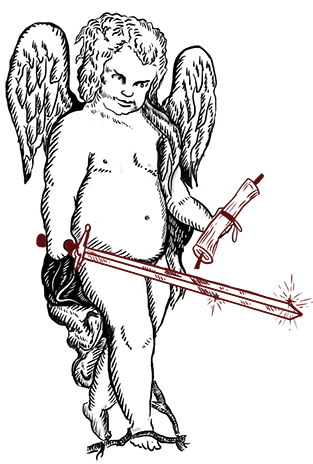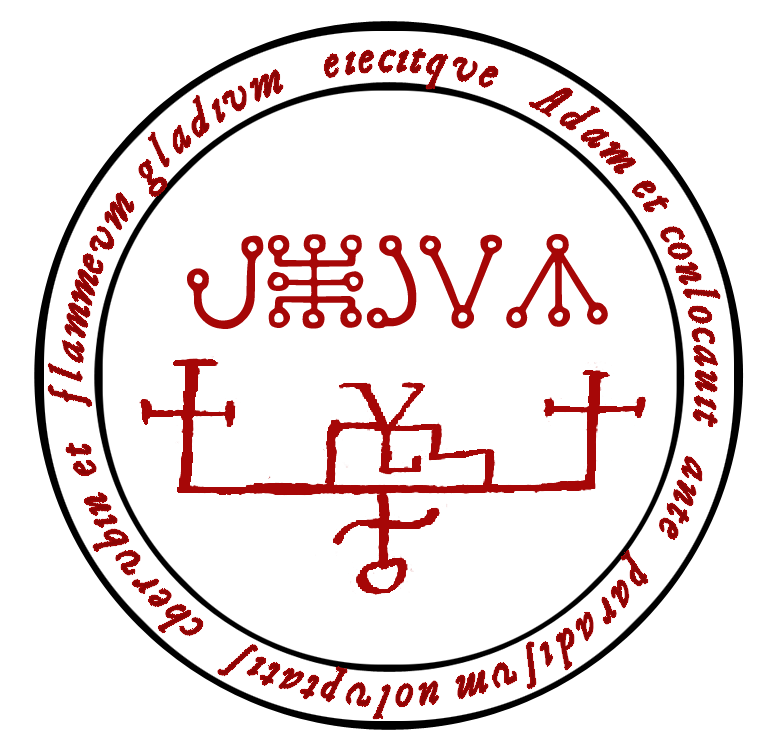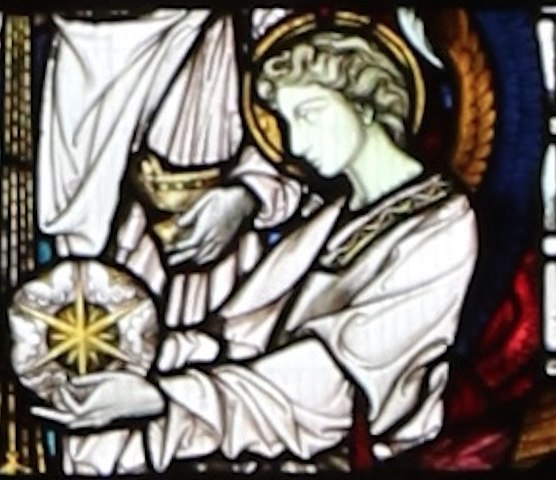Archangel Uriel

Archangel Uriel or Auriel (Hebrew: אוּרִיאֵל ʾŪrīʾēl, "God is my flame"; Greek: Οὐριήλ Oúriēl) is one of the archangels prominently mentioned in the post-exilic rabbinic tradition and in certain Christian traditions. He is well known in the Russian Orthodox tradition and in folk Catholicism (in both of which he is considered to be one of the seven major archangels) and recognized in the Anglican Church as the fourth archangel.
In the hierarchy of angels, Uriel does not rule over one of the 9 choirs, but is the prince of the triplicity of Innocents, Martyrs, and Confessors.
Name and origins
The angels mentioned in the older books of the Hebrew Bible are without names. Rabbi Simeon ben Lakish of Tiberias (230–270) even asserted that all of the specific names for the angels were brought back by the Jews from Babylonian knowledge. Of the seven archangels in the angelology of post-exilic Judaism, only two of them, Archangel Michael and Archangel Gabriel, are mentioned by name in the canonized Jewish scriptures, in the Book of Daniel in particular, which is one of the youngest books in the Tanakh.
Uriel appears in the Second Book of Esdras found in the Biblical apocrypha (called Esdras IV in the Vulgate) in which the prophet Ezra asks God a series of questions and Uriel is sent by God to instruct him. According to the Revelation of Esdras, the angels that will rule at the end of the world are Michael, Gabriel, Uriel, Raphael, Gabuthelon, Beburos, Zebuleon, Aker, and Arphugitonos. The last five listed only appear in this book and nowhere else in apocryphal or apocalyptic works.
Attributes and abilities
Uriel is often portrayed as a cherub holding a flaming sword and carrying a book or a papyrus scroll representing wisdom. He "stands at the Gate of Eden with a fiery sword," or as the angel "who is over the world and over Tartarus." Uriel is a patron of the arts.
In the Life of Adam and Eve, Uriel is regarded as the spirit of the third chapter of Genesis. He is also identified as one of the angels who helped bury Adam and Abel in Eden.
It was Uriel who checked the doors of Egypt for lamb's blood during the plague. He also holds the key to the Pit during the End Times, and led Abraham to the west.
Exorcist
In the Secret Book of John, an early Gnostic work, Uriel is placed in control over the demons who help Yaldabaoth create Adam. Uriel was named in an exorcism in the 15th century, reported by Robert Ambelain in Arabic Astrology on page 18, without indication of date, place of origin etc.: Conjuro te diabolo per sanctum Michaelem, sanctum Gabrielem, sanctum Raphaelem, sanctum Urielem.
In the Apocalypse of Peter, he appears as the angel of repentance, who is graphically represented as being as pitiless as any demon. The specific demon he rules over is Mahazael.
Occult traditions

In apocryphal, kabbalistic, and occult works, Uriel's name is commonly spelled "Auriel." He is regarded as the archangel of the North, and of the element of earth. Where a fourth archangel is added to the named three, to represent the four cardinal points, Uriel is generally the fourth. Uriel is listed as the fourth angel in Christian Gnostics (under the name Phanuel). However, it is debated whether the Book of Enoch refers to the same angel by two different names. Uriel means "God is my flame," whereas Phanuel means "God has turned."
Uriel is the third angel listed in the Testament of Solomon. Uniquely to this text, he is claimed to be the father of the demon Ornias.
According to the teaching of the modern Hermetic Order of the Golden Dawn, Uriel is the archangel of North and of Earth, and is thus associated with the vegetation of the Earth. In iconography he is depicted holding stems of ripened wheat and wearing robes of citrine, russet, olive, and black. His element is fire.
In Henry Wadsworth Longfellow's Golden Legend, Uriel is one of the angels of the seven planets. Uriel is the angel of Mars. He is also listed as such in Benjamin Camfield's A Theological Discourse of Angels (1678). Other sources have him ruling over the fixed stars and the Moon.
In Thomas Heywood's Hierarchy of Blessed Angels (1635), Uriel is described as an angel of the earth. Heywood's list is actually of the angels of the four winds: Uriel (south), Michael (east), Raphael (west) (serving also a governor of the south, with Uriel), and Gabriel (north). He is also listed as an angel of the four winds in the medieval grimoire Sefer Raziel HaMalakh which lists him as Usiel (Uzziel); according to it, this book was inscribed on a sapphire stone and handed down from Seraph to Metatron and then to Adam.
The Bible verse used to connect with Uriel is: Genesis 3:24 - "After he drove the man out, he placed on the east side of the Garden of Eden cherubim and a flaming sword."
Book of Enoch
The Book of Enoch mentions Uriel in many of its component books. In chapter IX, which is part of "The Book of the Watchers" (2nd century BCE), only four angels are mentioned by name; however, the later chapter XX lists the names and functions of seven angels. Those angels are: "Uriel, one of the holy angels, who is over the world and over Tartarus, Raphael, Raguel, Michael, Saraqâêl, Gabriel, and Remiel."
The Book of the Watchers as a whole tells us that Uriel, Raphael, and Gabriel were present before God to testify on behalf of humankind. They wish to ask for divine intervention during the reign of the grigori (fallen watchers). These fallen take human wives and produced half-angel, half-human offspring called the nephilim. Uriel is responsible for warning Noah about the upcoming great flood.
Then said the Most High, the Holy and Great One spoke, and sent Uriel to the son of Lamech, and said to him: "<Go to Noah> and tell him in my name 'Hide thyself!' and reveal to him the end that is approaching: that the whole earth will be destroyed, and a deluge is about to come upon the whole earth, and will destroy all that is on it."
After judgment has been brought upon the nephilim and the fallen ones (see The Book of Giants), including the two main leaders Samyaza and Azazel, Uriel discusses their fates:
And Uriel said to me: "Here shall stand the angels who have connected themselves with women, and their spirits assuming many different forms are defiling mankind and shall lead them astray into sacrificing to demons 'as gods', (here shall they stand,) till 'the day of' the great judgment in which they shall be judged till they are made an end of. And the women also of the angels who went astray shall become sirens.' And I, Enoch alone, saw the vision, the ends of all things; and no man shall see as I have seen."
Uriel then acts as a guide for Enoch for the rest of the Book of Watchers. He fulfills this capacity in many of the other books that make up Enoch.
Veneration
Catholic
At the Council of Rome of 745, Pope Zachary, intending to clarify the church's teaching on the subject of angels and curb a tendency toward angel worship, condemned obsession with angelic intervention and angelolatry, but reaffirmed the approval of the practice of the reverence of angels. This synod struck many angels' names from the list of those eligible for veneration in the church of Rome, including Uriel.
Only the reverence of the archangels mentioned in the recognised Catholic canon of scriptures, namely Michael, Gabriel, and Raphael, remained licit. In the 16th century, archangel Uriel appeared before the Sicilian friar Antonio Lo Duca and told him to build a church in the Termini area. Lo Duca told pope Pius IV about the apparition, the pope then asked Michelangelo to design the church. It is the church of Santa Maria degli Angeli e dei Martiri, located at the Esedra Plaza.
In the first half of the 11th century, Bulgarian followers of the dualist heresy called Bogomilism, who lived in the dukedom of Ahtum in present-day Banat, invoked Uriel in rituals.
Other Christian denominations
The Anglicans venerate Uriel as the patron saint of the zodiac and constellations of stars. St Martin in the Bull Ring, a Church of England parish church in the city of Birmingham, England, has a gigantic stained glass window which includes a depiction of Uriel holding a luminous star.
Coptic Christians of Ethiopia and Eritrea venerate archangel Uriel with 11 July as his feast day. In the Ethiopian Homily on the Archangel Uriel, he is depicted as one of the great archangels, and as the angelus interpres who has interpreted prophecies to Enoch and Ezra, and the helper of both of them.
According to the Homily, at the time of the Crucifixion of Jesus, Uriel dipped his wing in the blood and water flowing from Christ's flank and filled a cup with it. Carrying the cup, he and the Archangel Michael rushed into the world and sprinkled it all over Ethiopia, in every place where a drop of blood fell a church was built. Thus Uriel is often depicted carrying a chalice filled with the blood of Christ in Ethiopian Orthodox iconography.
